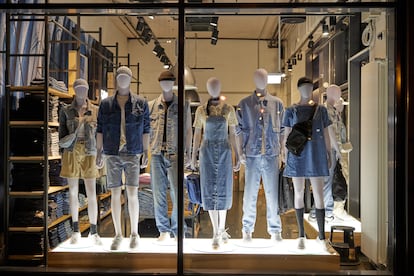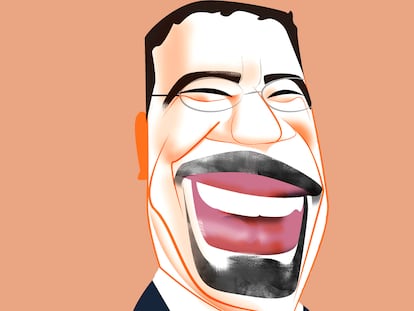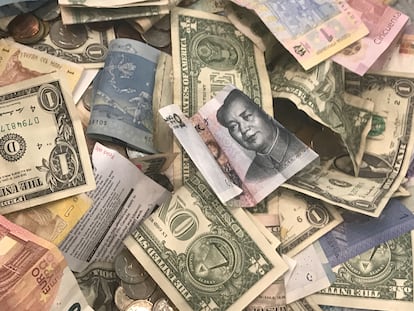Levi’s tightens its belt to add flare to its jeans
The new CEO of the century-old textile brand is focused on implementing a major cost adjustment process to improve profitability and overcome losses


Pop superstar Katy Perry was spotted last weekend at the Coachella Valley Music and Arts festival in California’s Colorado desert. The American singer was there to support her best friend, Mia Moretti, who was making her debut as a DJ. At the closing of the famous music event, Perry went to see rapper Doja Cat dressed in a black body and ultra baggy jeans that barely clung to her hips. It seems 2000s fashion is back. This has been confirmed by Vogue, Marie Claire, Glamour and even InStyle, which went so far as to call 2023 the year of baggy pants.
Because of their infinite capacity to be constantly recycled regardless of the passing of trends, jeans are said to never go out of fashion. However, one of the pioneers of this classic textile is undergoing a profound transformation. Levi Strauss & Co., a company with more than 170 years of experience, has embarked on a restructuring to bolster its brand and retain consumers who are finding more and more choices in the marketplace.
The company is focusing on two garments — baggy pants and denim skirts — that will serve as flagships in a season of change. Demand, mostly driven by women, has exceeded expectations and propelled sales of flared jumpsuits, flared pants and low-rise pants. The world has also rediscovered its appetite for jeans in the aftermath of the pandemic. The iconic 501 jeans sold 11% more last year compared to 2022, according to Levi’s annual report.
However, Levi’s biggest innovation is hidden from the public spotlight and goes by the name of Project Fuel. This will “improve the speed, agility and efficiency of our business,” Michelle Gass, the CEO of the company, explained in an email sent to all employees at the end of February.
The project also entailed some trade-offs. These were announced by Gass earlier in the year when she took over from CEO Chip Bergh and became the company’s leading figure. She then adopted the “difficult but necessary task of reducing the workforce.” The layoffs were primarily in corporate positions, where 12% of office workers were made redundant. The cutbacks cost the company $116 million in restructuring costs.
The move was welcomed by Wall Street. Levi Strauss reported a first-quarter loss of $11 million earlier this month. Last year, in the same period, it posted a net profit of $115 million. Even so, the results surpassed market forecasts. The day after the announcement, the firm’s shares soared by 18%, representing the biggest daily increase in the stock market in the last four years. “Overall, the year has started off quite well,” said Paul Lejuez, a Citi analyst, in a briefing note distributed to the bank’s clients.
Factory in Poland
In addition to the layoffs, the company has adopted other measures to become more agile and target online shoppers and the customers who visit its 500 stores worldwide. It has wound down its footwear business in Europe, its second-largest market after America, to focus on clothing manufacturing. It also severed ties with the plus-size-focused brand Denizen and closed a factory in the Polish city of Plock, which had been running since 1991, citing problems in hiring skilled workers and rising production costs. The closure of the Polish facility resulted in 650 people being laid off.
With headquarters in San Francisco, where it occupies a striking bay-front building, Levi Strauss has shown confidence in emerging from the red in the second half of the year.
For the time being, first-quarter sales of $1.5 billion represent a slump of 8% compared to the same period in 2023. The figure is the result of the downturn in sales outlets in shopping malls and large galleries, which have yet to recover from the pandemic. These include Macy’s and Kohl’s, where, incidentally, Michelle Gass has moved from. In terms of geographic markets, Levi’s sales remained stable in Asia, but fell in Europe (7%) and more sharply in the Americas (11%). Harmit Singh, the company’s chief financial officer, said in a recent interview with The Wall Street Journal that they will be back on track for “mid-single-digit” growth by the second half of the year. The denim juggernaut claims it will end the fiscal year with inventory lower than in 2023.
Executives remain optimistic about the results of the restructuring, which has resulted in more available liquidity. These resources are being channeled into growth, especially outside the United States. The international market represents 56% of Levi Strauss’ total business.
In February, the company inked an agreement with Expofaro, a Colombian family-owned company with 40 years of experience in the textile sector. This agreement allows Levi Strauss to acquire 90 sales points in 40 stores in the South American country. In addition, Expofaro has become a distributor for other regions of the continent.
Gass highlighted earlier this year at her meeting with investors the success of the company’s clusters that consolidate regional operations. She also cited as a success story the company’s store in Bangalore, India, a city that will be home to its second-largest store in the world since 2023, measuring 700 square meters (only second to the one in San Francisco). Gass says the company is contemplating the consolidation of its European operations, now divided into North and South, into a single regional office with teams focused on each country on the continent.
Some say that Levi’s is riding high thanks to Beyoncé. The hugely popular singer and fashion icon released Cowboy Carter at the end of March. The album has climbed the charts and features a duet with Post Malone named Levii’s Jeans. The retailer immediately seized the opportunity and posted pictures of its products on Instagram. From mom jeans to the popular low-rise pants. Now all that remains is for the pop superstar’s endorsement to lead to higher sales for the century-old denim brand. So far this year, the shares have rallied 20.5%, bringing the company’s stock market value to $8.1 billion.
Sign up for our weekly newsletter to get more English-language news coverage from EL PAÍS USA Edition









































